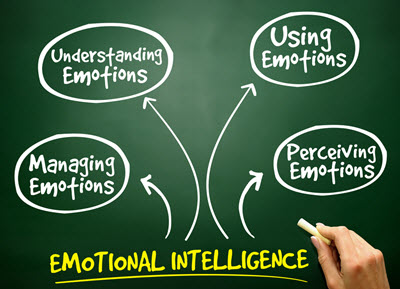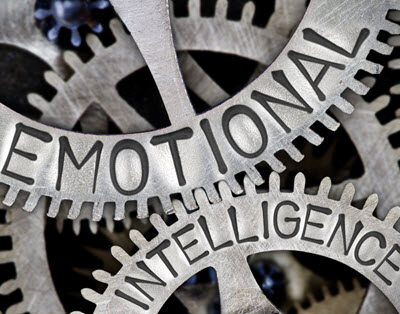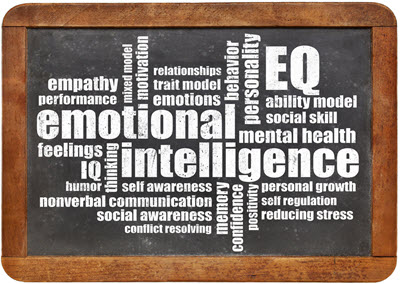 What is emotional intelligence?
What is emotional intelligence?
The strict definition of Emotional Intelligence is the capacity to be aware of, control, and express one’s emotions and to handle interpersonal relationships judiciously and empathetically.
Emotional Intelligence is a term initially created by two researchers, Pete Salavoy and John Mayer. It became popular by Daniel Goleman in his 1996 book of the same name.
Emotional Intelligence (EI) is also known as Emotional Quotient (EQ). It describes the ability to:
- Recognize, understand, and manage our own emotions
- Recognize, understand, and manage the emotions of others
Practically speaking, it means being aware of our emotions so that they can drive our behavior and impact people both positively and negatively.
It also is learning how to manage those emotions, both our own and others, especially when we are under pressure.
 Why is it important to be emotionally intelligent?
Why is it important to be emotionally intelligent?
We all know that person, the one who treats people well, stays calm, cool, and collected in times of stress. This is the person who knows just the right thing to say to influence others and has overall good energy and is enjoyable to be around.
A great leader typically has a high EQ.
Does that describe you? Do you want people to say that about you?
In today’s working environment, a good level of knowledge and intellectual ability is taken for granted. But if you want to stand out from the crowd and be successful, you need more than that.
 Abilities of leaders with high EI
Abilities of leaders with high EI
Emotional Intelligence (EI) is becoming the differentiator, the way in which great leaders and professionals can stand out.
Characteristics of a leader with high EI include the ability to recognize our own feelings and those of others, motivate ourselves, and manage emotions effectively in ourselves and others.
 Components of Emotional Intelligence
Components of Emotional Intelligence
Daniel Goleman first brought emotional intelligence into focus with his 1996 book entitled, Emotional Intelligence. He found that while the qualities traditionally associated with leadership, such as intelligence, toughness, determination, and vision are required for success, they are insufficient.
Truly effective leaders are distinguished by a high degree of Emotional Intelligence, and they display many leadership skills.
They have a high degree of self-awareness and are able to recognize what you are feeling, to understand your habitual emotional responses to events, and to recognize how your emotions affect your behavior and performance.
They are skilled at managing emotions by staying focused and thinking clearly when experiencing powerful emotions.
They can motivate themselves and use your deepest emotions to move and guide you toward your goals.
They are capable of empathy and are able to sense, understand, and respond to what other people are feeling.
They have social skills, which help them manage, influence, and inspire emotions in others.
Understanding your Emotional Intelligence
After several years of working with individuals and groups, including executive teams, I’ve designed a unique program to help understand individual behaviors and apply those behaviors to discern and improve Emotional Intelligence.
With the program, you learn your own behavioral style, your triggers based on that style, and how others react to your style.
By understanding your individual behaviors in various situations, you will incorporate that knowledge to increase your Emotional Intelligence. Completely individualized, yet this program is workable in group settings.
Programs are completely customized to fit your individual or company needs. One-on-one consultations, group two-hour, half-day, and full-day sessions, including offsite retreats, are available.
By the way, Millennials and Generation Z interested in developing Emotional Intelligence become more valuable to their organization!
Here’s what people are saying about the program:
“Content and overall presentation were excellent! Really enjoyed the information!”
“Understandable and relatable material.”
“I appreciated the example you used in teaching us to make the topic more applicable to our company and employees. Thank you for your one-on-one time also – I learned a lot!”
“Interactive and fun!”
“Variety of activities, open discussion, and created a safe place.”
“I appreciated the time with Eileen. She helped us understand Emotional Intelligence without shaming.”
“I enjoyed the subject and the format.”
“This was great training for my professional and personal life. I would love to learn more about this!”
Let’s improve your Emotional Intelligence.
Contact me at (856) 506-5159 for a discussion on how to improve your workforce and increase Emotional Intelligence. You’ll be glad you did!

